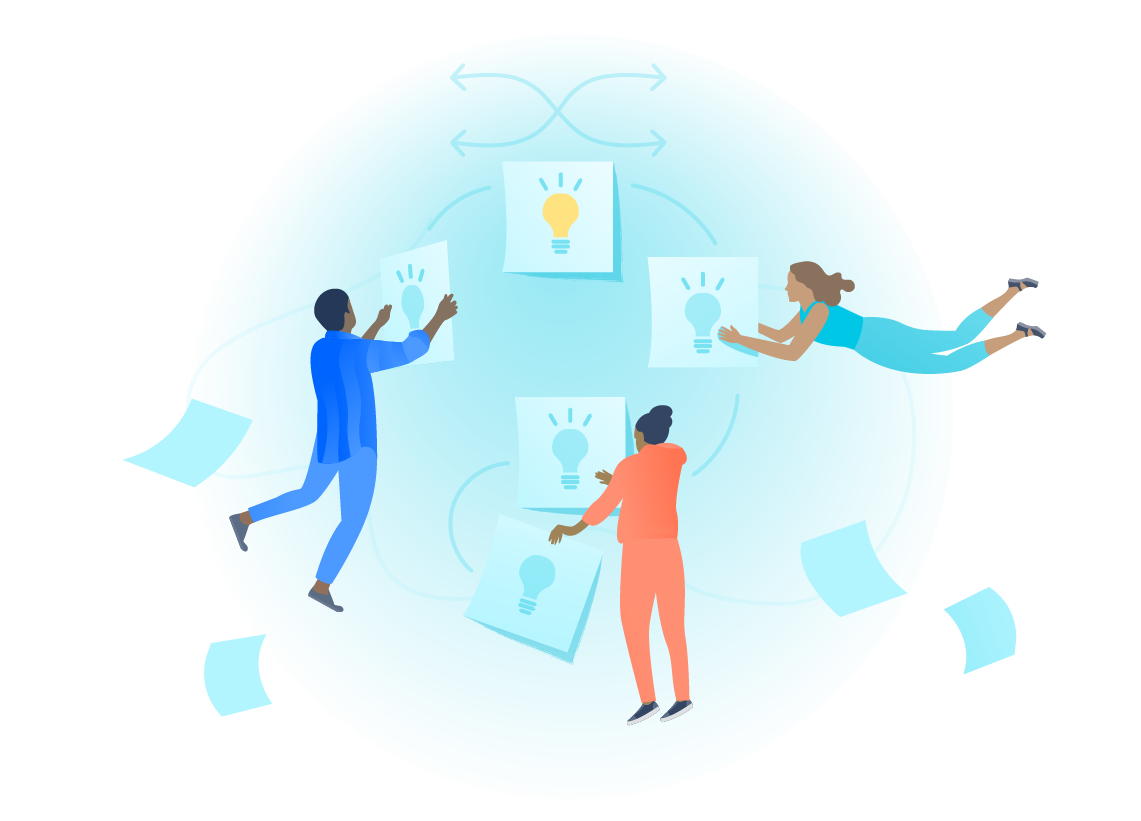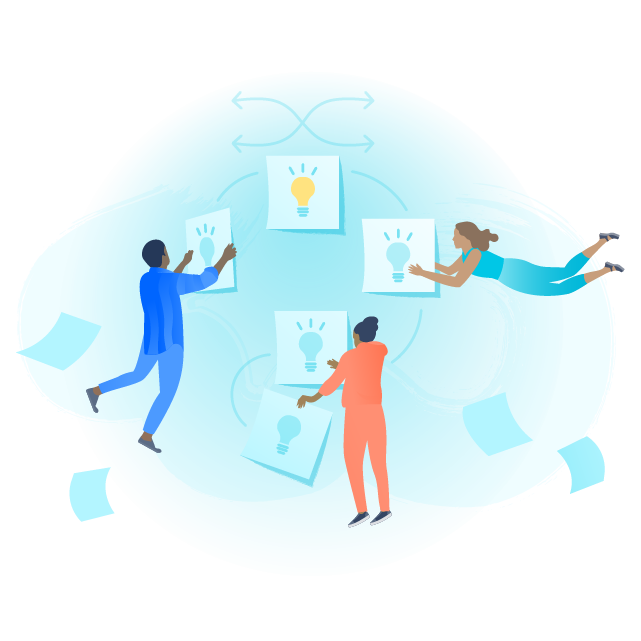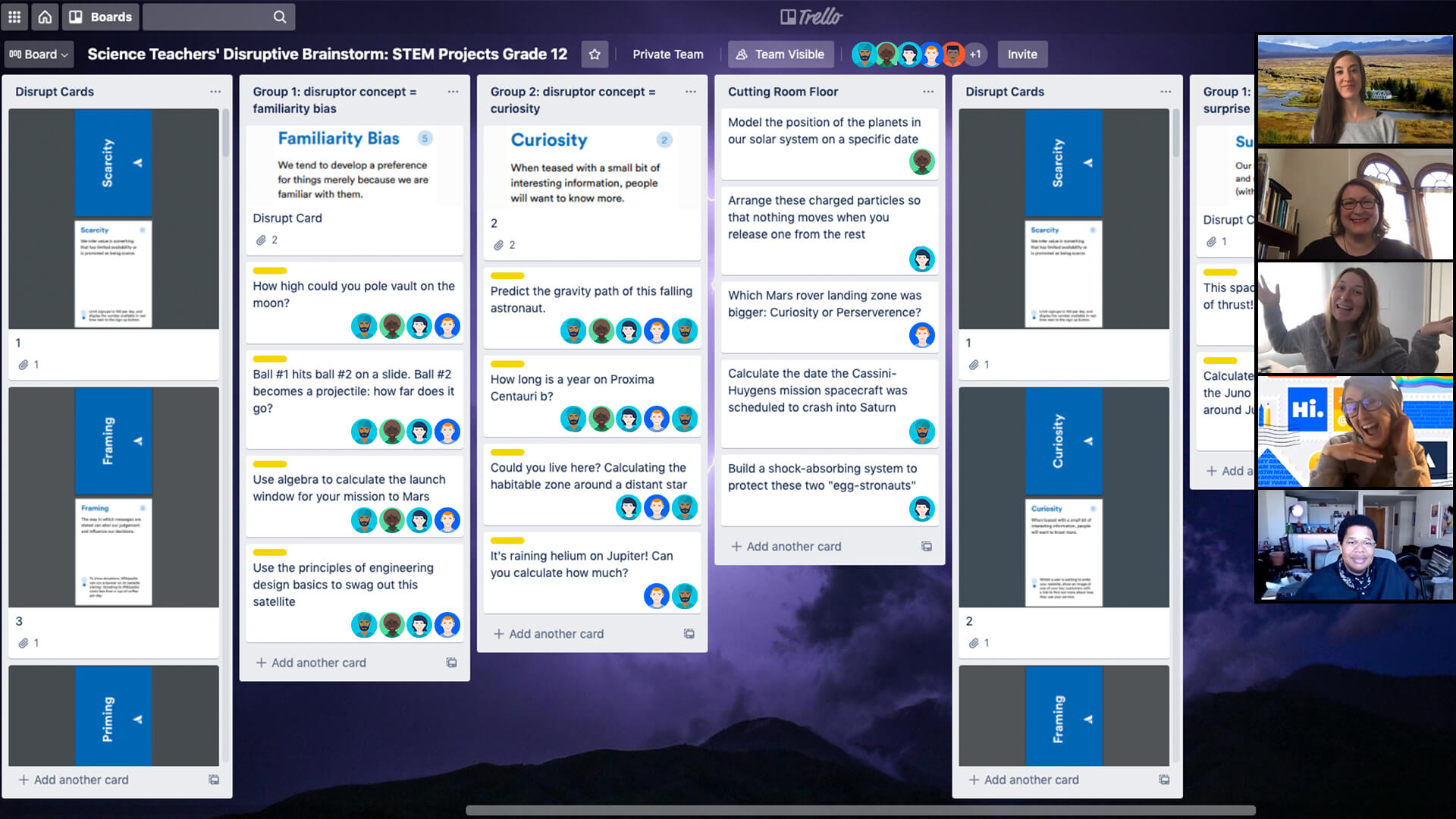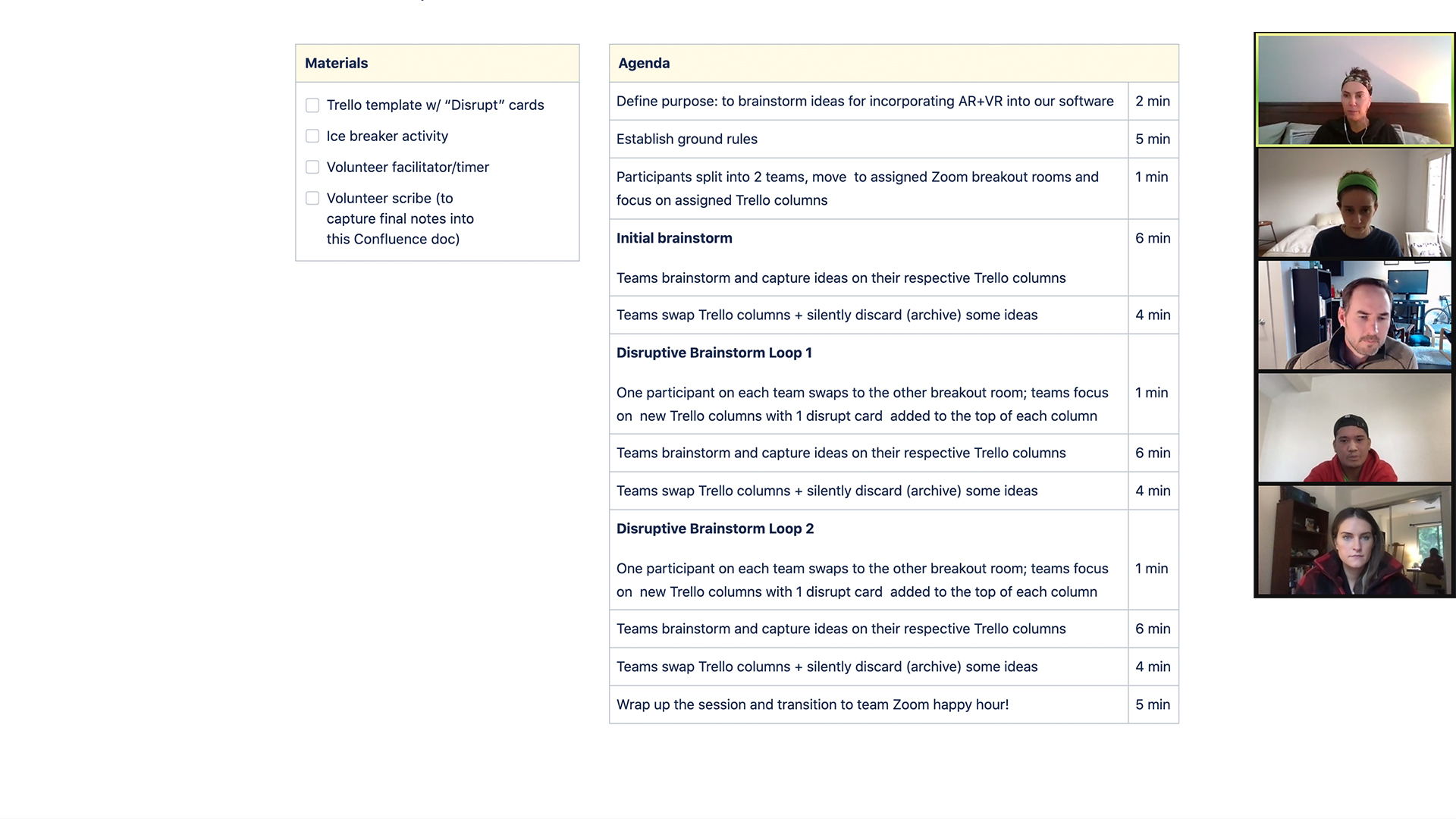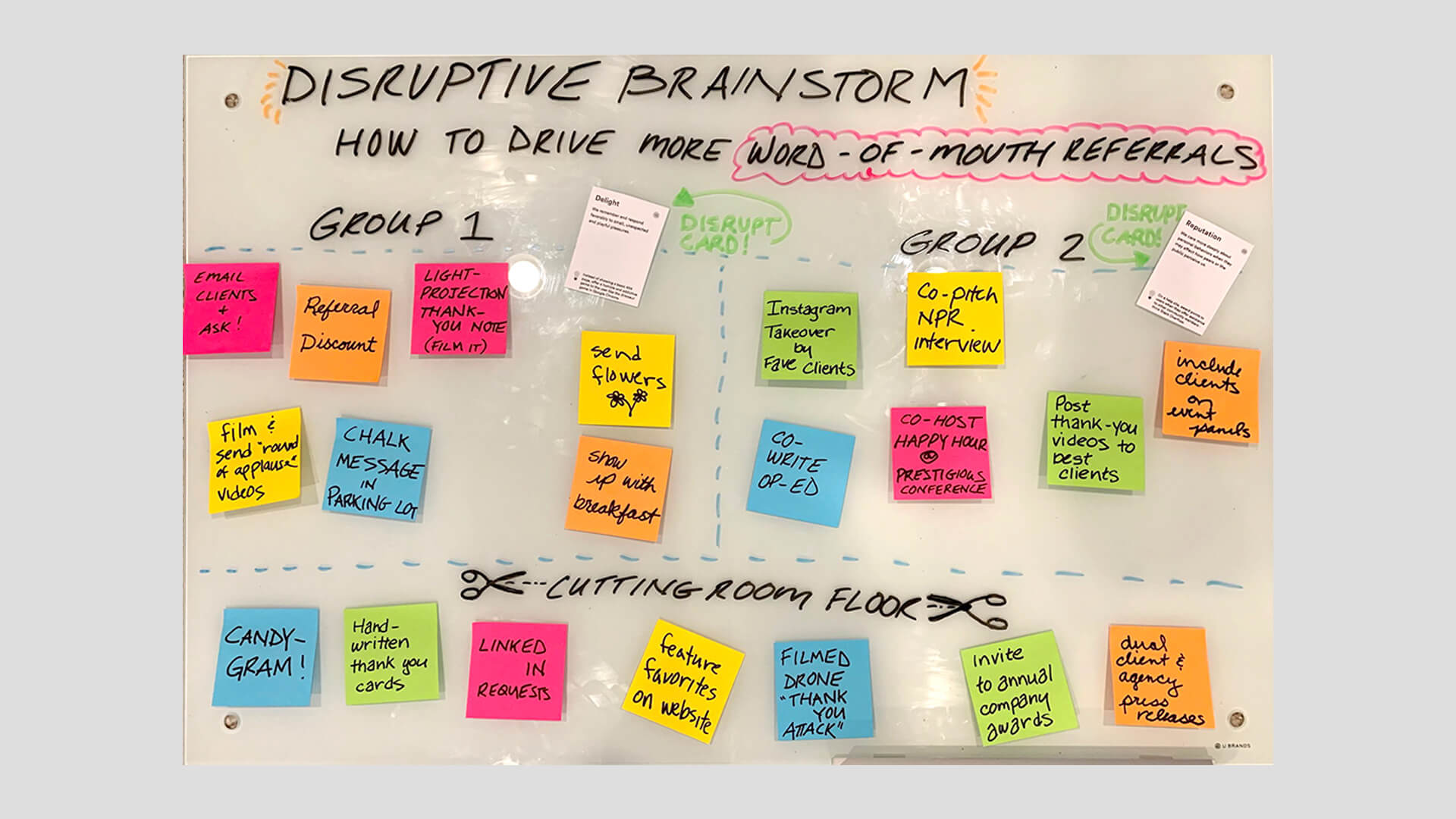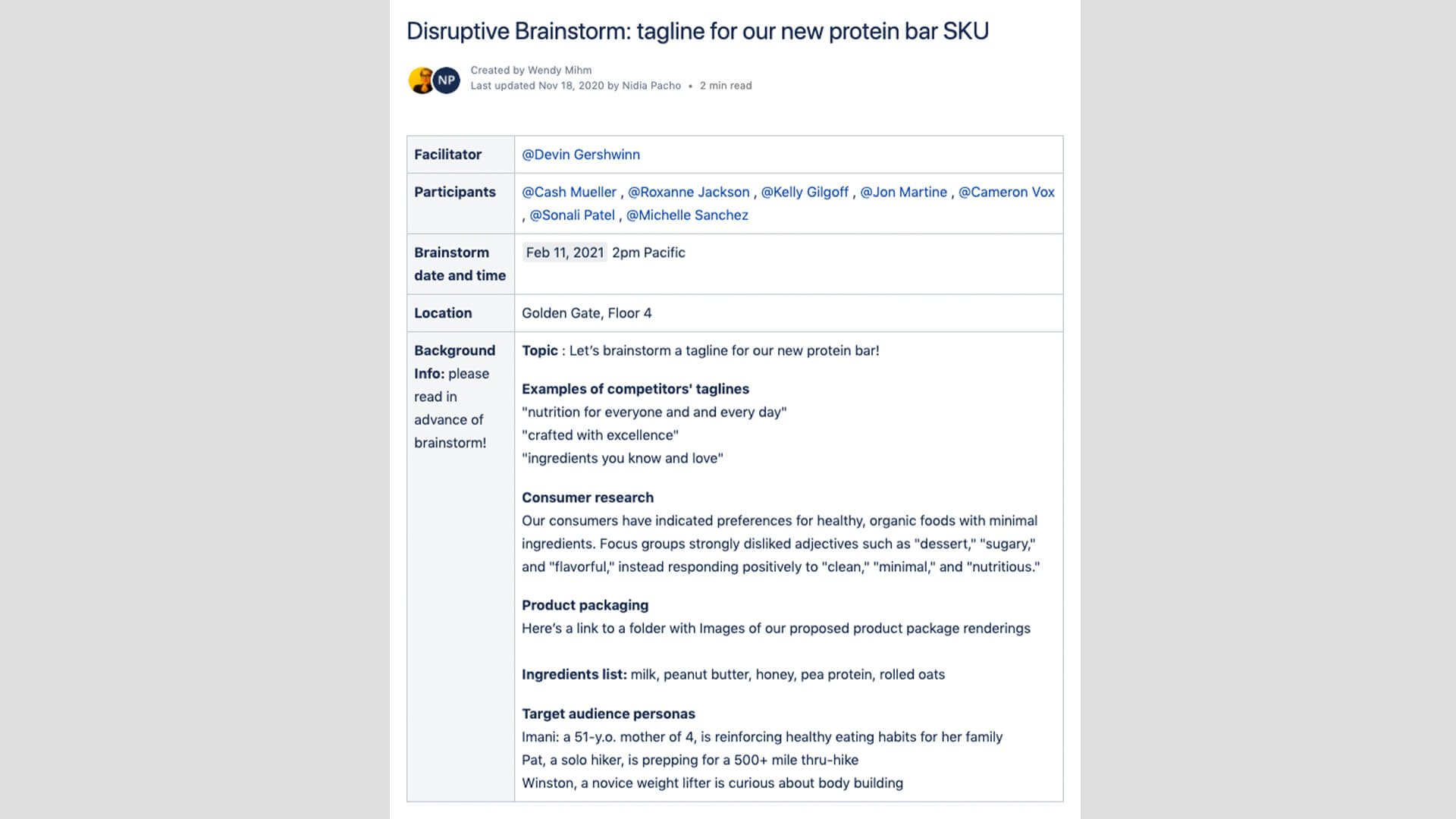Brainstorming disruptivo em ação
Professores de ciências discutem novas ideias de projetos STEM para estudantes do ensino médio.
Uma equipe de desenvolvedores de software usou o Confluence para se preparar para a sessão de brainstorming disruptiva.
Uma equipe de uma agência de publicidade discute ideias para gerar mais referências boca a boca.
O que você vai precisar
Remoto
Videoconferência com compartilhamento de tela
Ferramenta de colaboração digital (ver templates)
Temporizador
Presencial
Espaço de reunião
Quadro branco, ou folha grande de papel
Notas adesivas
Marcadores
Temporizador
Templates opcionais
Templates da Atlassian
Instruções para executar esta tática
1. Preparação 15 min
Primeiro, defina um tema para a sessão de brainstorming. O tema pode ser amplo ou restrito — qualquer problema que precise ser resolvido ou processo que precise ser aprimorado é um jogo justo. Apenas confirme se declarou o tema com precisão para que todos entendam o que eles vão discutir.
Em seguida, prepare os materiais. Equipes remotas — sobretudo aquelas assíncronas — devem criar um documento de colaboração, como um quadro do Trello ou uma página do Confluence. Você pode usar os templates disponibilizados no topo desta página, se quiser, ou criar o próprio. Você também vai precisar baixar os Cartões de disrupção e os aprontar para compartilhar a tela.
Equipes presenciais devem encontrar um quadro branco ou papel grande e deixar notas adesivas e marcadores na sala de reunião. Imprima os Cartões de disrupção e traga com você.
Por fim, crie um documento com toda a pesquisa e todo o contexto relevantes sobre o tema. Compartilhe o documento com a equipe com alguns dias de antecedência para que eles possam começar a pensar sobre o tópico. Você pode incluir informações como pesquisas sobre concorrentes e consumidores, modelos de design, personas de compradores, paletas de cores — tudo o que achar útil para a equipe.
Defina um tópico claro para brainstorming.
Então crie um documento com toda a pesquisa e todo o contexto relevantes sobre o tema. Compartilhe o documento com a equipe com alguns dias de antecedência para que eles possam começar a pensar sobre o tema.
DICA: ESCOLHA UM TÓPICO
Existe algum problema que a equipe possa resolver? Um processo que pode ser refinado? Existe algo que está frustrando os clientes?
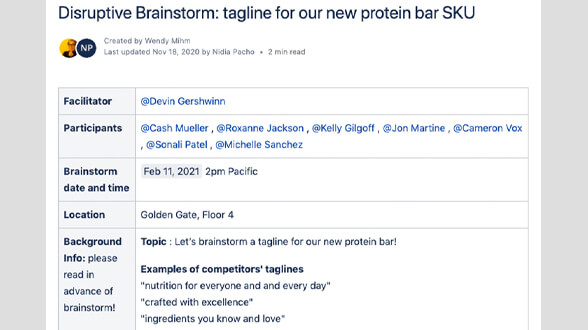
EXEMPLO: INFORMAÇÕES DE CONTEXTO
Esses profissionais de marketing capturaram informações de contexto no Confluence para seu futuro de brainstorm disruptivo.
2. Prepare o cenário 5 min
No início da reunião, informe à equipe o seguinte:
- A equipe está aqui para produzir o máximo de ideias possível. Você quer quantidade — a qualidade vai vir depois.
- É importante manter a mente aberta e lembrar que as ideias de todos são válidas.
- O objetivo da reunião é gerar, não julgar. No final, vai haver algumas boas ideias para a equipe agir. Confie no processo!
3. Brainstorm 10 min
A equipe deve se dividir em dois grupos para fazer várias rodadas de brainstorming. Use a funcionalidade de salas simultâneas do software de videoconferência para reuniões remotas ou híbridas.
Defina um cronômetro para 10 minutos e inicie a sessão de brainstorming. Crie o máximo de ideias possível. Não se esqueça de que nada está fora de questão. O objetivo é alcançar essa quantidade máxima.
Faça com que os membros da equipe adicionem ideias, uma de cada vez, ao template, ao quadro branco ou às notas adesivas. Discuta cada ideia com o grupo à medida que o membro da equipe a adiciona para ver se alguém tem algo a acrescentar ou refinar.
4. Corte! 5 min
Reúna os grupos.
Peça a cada grupo que remova ideias do quadro do outro grupo em silêncio. Remova ideias que você não vai conseguir alcançar, não vão ter apoio ou não vão estar relacionadas com o tema do brainstorming. O corte generoso de ideias é importante para dar espaço para novas. Não se esqueça: nenhuma discussão durante essa fase.
DICA: SILÊNCIO, POR FAVOR
Discutir o que os membros da equipe removem interrompe o fluxo criativo e leva ao julgamento. Mantenha a criatividade viva ficando em silêncio.
DICA: PISO DA SALA DE CORTE
Evite revisitar ideias vetadas durante a sessão para manter o ímpeto criativo.
5. Disrupção 5 min
Agora vem a parte divertida: mude um membro de cada grupo para o lado oposto para mudar como todos estão pensando. Em seguida, faça com que cada grupo escolha um número aleatório de um a 33 — o número vai corresponder a um Cartão de disrupção. Os grupos vão usar o cartão para orientar a próxima rodada de ideias.
DICA: ÂNGULO NOVO
Os Cartões de disrupção restringem o brainstorming e forçam a equipe a encarar o desafio de uma perspectiva diferente.
6. Faça um novo brainstorm 10 min
Com o novo membro da equipe e o Cartão de disrupção, separe os grupos de novo, programe um cronômetro para 10 minutos e comece uma nova rodada de brainstorming. Desta vez, as ideias devem estar relacionadas ao conceito no Cartão de disrupção.
7. Corte! de novo 5 min
Mais uma vez, reúna os grupos e faça com que cada grupo remova ideias da outra lista de brainstorming. Faça essa etapa em silêncio e sem discussão.
8. Rodada final 10 min
Faça com que uma pessoa diferente de cada grupo troque de lado e escolha um novo Cartão de disrupção para cada equipe, sem um padrão.
Defina um cronômetro para 10 minutos e faça um brainstorming pela última vez.
9. Corte final 5 min
Reúna os dois grupos para a edição final. Faça com que seja o corte mais significativo até agora, mesmo que (ou sobretudo se) isso signifique que restem apenas uma ou duas ideias por equipe. As ideias finais devem valer a pena prosseguir.
Acompanhamentos
Ação
Após o corte final, reúna as ideias que sobraram. Atribua a cada ideia um proprietário que vai investigar como transformar a ideia em realidade. Faça uma lista do que a equipe precisa saber para lançar a ideia e inclua um cronograma para quando o proprietário estiver pronto para discutir as descobertas com a equipe.
Documento
Publique o documento de colaboração ou as notas adesivas da sessão de brainstorming em um espaço onde toda a equipe possa ver e consultar quando necessário.
Se sua equipe usa o Jira, adicione itens de ação da sessão de brainstorming como ideias ao projeto do Jira da sua equipe.
Variações
Embaralhamento
Em vez de trocar apenas um membro da equipe entre as rodadas, desloque as salas de reunião (para equipes remotas) ou atribua equipes aleatoriamente (para equipes presenciais).
Supercortes
No início de cada rodada de cortes, especifique quantas ideias cada grupo pode deixar no quadro ao final da rodada. Experimente duas a três ideias para um desafio ou uma para o modo avançado.
Envelope, por favor
Para uma sessão remota, pré-selecione os cartões de disrupção e adicione as informações de cada um a uma planilha colaborativa para cada grupo. Use a ferramenta de preenchimento para ocultar os detalhes e faça com que o grupo “descubra” um cartão por vez removendo o preenchimento.
Para táticas presenciais, pré-selecione os cartões de disrupção e coloque em envelopes no espaço de cada grupo. Abra um novo envelope a cada rodada.
A pré-seleção dos cartões pode ajudar a orientar as sessões em uma direção específica ou, pelo menos, evitar cartões que você sabe que não serão sobre o tema. A pré-seleção também pode ajudar a lidar com os pontos fortes e fracos de uma equipe específica.
Explore outras táticas
Mantenha-se atualizado
Receba as últimas dicas sobre táticas e vida profissional ao se inscrever em nossa newsletter.
